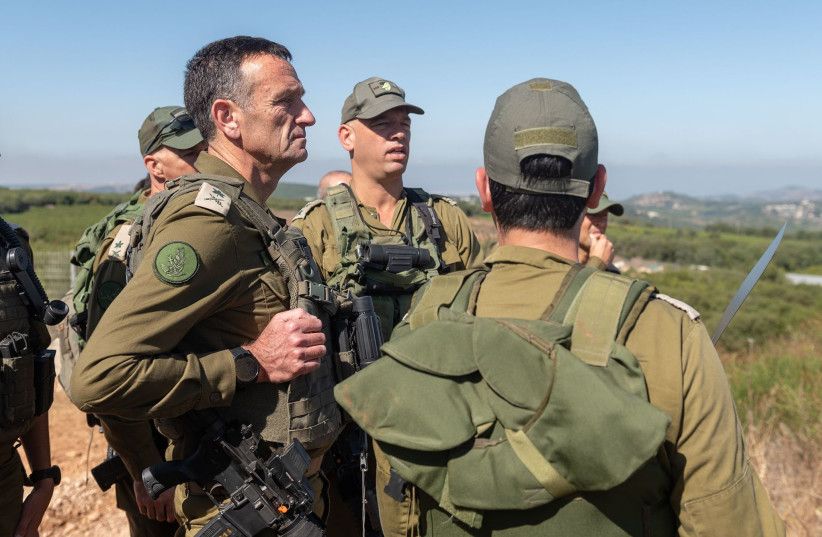Israel’s top army brass and its president visited the Lebanese border Wednesday amid heightened tensions with the Iranian proxy group Hezbollah, as France reportedly worked to prevent an outbreak of hostilities.
The Lebanese people “don't deserve the Iranian spell that kills and ruins many parts of their country. They definitely don't deserve the involvement of Hezbollah, which undermines their stability and well-being,” he said.
Separately IDF Chief of Staff Lt.-Gen. Herzi Halevi visited the northern border accompanied by IDF Northern Command Maj.-Gen. Uri Gordon and Galil Division Commander Brig.-Gen. Shai Kalfer.
During the visit, Halevi observed the status of the IDF’s ongoing project to build a more substantial fence alongside a series of security obstacles to augment the barrier.
The IDF said it has added dozens of kilometers of additional fencing and obstacles in recent months to thwart Hezbollah’s infiltration attempts.

Gordon and Kalfer presented Halevi with their broad strategy for defending the northern border and its residents from Hezbollah. They presented new technologies and tactics for disrupting Hezbollah's entrenchment and infiltration attempts.
In Beirut on Tuesday, former French foreign minister Jean Yves Le Drian, who is his country’s envoy to Lebanon, met with Hezbollah representatives and passed an indirect message from Israel calling for calm. The main focus of his visit, however, has been the country’s political instability.
Israel is “working through different channels to send messages” on the situation, a diplomatic source said.
On Tuesday, Israel’s ambassador to the United Nations Gilad Erdan warned the organization’s Security Council warned that the “Middle East is a powder keg on the cusp of being ignited.”
“Tensions along Israel’s northern border with Lebanon are higher than they have been in years as a result of Hezbollah’s violent escalations, blatant violations of Security Council resolutions, and dangerous military advancements,” Erdan wrote in a letter to the council.
He urged the UNSC to condemn Hezbollah’s actions and demand Lebanon disarm the Iranian proxy group which has entrenched itself on Israel’s northern border. The UNSC must also ensure that the organization’s peacekeeper force, known as the UN Interim Force in Lebanon (UNIFIL), be given full access to inspected Hezbollah military sites, he said.
If these things do not happen, he warned, “the situation on the ground will continue to deteriorate and the consequences will be far-reaching and disastrous.”
“Hezbollah – with Iran’s funding and directive– has become more brazen, increasing its actions and presence along Israel’s border,” Erdan said.
He pointed to Hezbollah’s failed attempt to sabotage Israel’s security fence on the northern border on July 12. Initially, the IDF distanced them from the barrier, he said, but they returned and “forcibly dismantled Israeli surveillance equipment on the fence.”
Hezbollah’s actions, Erdan said, violate UNSC Resolution 1701 which set out the terms of the cease-fire that ended the Second Lebanon War in 2006.
He described the past history of instability on the borders, explaining that Hamas had launched 34 rockets against Israel on April 6. Hezbollah held a wide-scale military drill along that border with live fire on May 21 and at the start of July Hezbollah fired an anti-tank missile at Israel.
Several weeks ago Hezbollah operatives crossed into Israel and erected two military structures south of the Blue Line.
“On July 15, a group of 18 infiltrators from Lebanon crossed south of the Blue Line, entering into Israeli territory, in clear violation of UNSCR 1701. This group included Lebanese Parliament Member, Qassem Hashem,” he said.
Dozens of Hezbollah compounds have been constructed along the Blue Line in the last year, he said. They are “manned by Hezbollah terrorists and solely serve military purposes,” he said. Many of them operate under the guise of NGOs such as Green Without Borders.
Israel holds Lebanon responsible for all military actions against it “emanating from its territory,” he told the council, Erdan said.
“I call on the Security Council to address Hezbollah's blatant and increasingly dangerous violations of UNSCR 1701, and condemn in the strongest terms, Iran and Hezbollah for destabilizing the region,” Erdan said.
He spoke in advance of the anticipated UNSC vote later this month to renew UNIFIL’s mandate for another year.
Netanyahu meets with security chiefs
On Sunday, Prime Minister Benjamin Netanyahu met with all of the security chiefs about the security situation in the North, with Hezbollah supporters recording themselves violating the border and waving their flag at the same time.
Last weekend, Hezbollah chief Hassan Nasrallah made his second threatening speech in the last few weeks against Israel, likely relating to whether Jerusalem will decide to use force to remove a small Hezbollah outpost in the Mount Dov disputed area as well as the visit of National Security Minister Itamar Ben Gvir to the Temple Mount.
At Sunday's government meeting, Netanyahu warned Hezbollah not to test Israel.